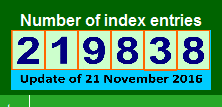Tuesday 29 November: Reconstructing West Clare family histories using DNA, with Paddy Waldron. Host: Kilrush & District Historical Society. Venue: Teach Ceoil, Grace Street,
Kilrush, Co Clare. 8pm. New members welcome. €5 for non-members.
Tuesday 29 November: Heylands & Gettys of Ballintemple & Cullyrammer, with R.W. Patterson. Host: North of Ireland Family History Society,
Causeway Coast and Glens Branch. Venue: Guide Hall, Terrace Row,
Coleraine, Co Londonderry. BT52 1HF. 8pm. All welcome.
Tuesday 29 November: A Dominican's view from Dublin Bridge, with Bernadette Williams. Host: Milestones of Medieval Dublin lunchtime lecture series. Venue: Wood Quay Venue, Civil Offices, Wood Quay,
Dublin 8. Free. 1:05pm. All welcome.
Saturday 3 December: The secrets of the Bog Bodies, with Eamon P Kelly. Host & venue: Tipperary County Museum, Mick Delahunty Square,
Clonmel, Co Tipperary. 10:30am. €5. All welcome. Seats allocated on a first come, first served basis.
Sunday 4 December: Evensong at St Patrick’s Cathedral, Dublin. A thanksgiving service to mark the 80th Anniversary of the Irish Genealogical Research Society. 3:15pm.
Details.
Monday 5 December:
Agnes Jones – Pioneering Nurse, with Gerald McGill. Plus Members' Research Meeting. Host: North of Ireland Family History Society,
Foyle Branch. Venue: Derry Central Library, 35 Foyle Street,
Londonderry, BT48 6AL. 7pm. All welcome.
Tuesday 6 December: Frongoch & 1916, a series of new 1916 exhibitions – Official Launch by Catriona Crowe. Host: Digital Repository Venue: National Museum of Ireland, Decorative Arts, Collins Barracks, Benburb Street,
Dublin 7. Noon. All welcome. No need to book.
Wednesday 7 to Friday 9 December: Reading Room closed to the public for annual media preview. National Archives of Ireland, Bishop Street,
Dublin 8. Free Genealogy Service will not operate on these dates.Reopens Monday 12 December.
Thursday 8 December: WWI Ireland: Exploring the Irish Experience, an exhibition tour. Host and venue: National Library of Ireland,
2/3 Kildare Street,
Dublin 2. Booking is not required. All welcome. 2pm.
Friday 9 December: Women of the Rising, with Dr Margaret Ward. Host: Enniskillen Library, Halls Lane,
Enniskillen, Co Fermanagh BT74 7DR. 12:30pm. Free. All welcome.Booking advised: T 028 6632 2886 or enniskillen.library@librariesni.org.uk.
Saturday 10 December:
Ower the Sheugh – considering the Irish and Scottish migrations across the Narrow Sea in historical prespective, with Dr Paddy Fitzgerald. Host: North of Ireland Family History Society,
Tyrone Branch. Venue: Omagh Library, Dublin Road,
Omagh, BT78 1HL. 10am. All welcome.
Saturday 10 December: The National Library's History & Heritage, an introduction to the Library's rich architectural history and the Signatories exhibition, plus a guided tour of the Reading Room. Venue: National Library of Ireland, Kildare Street,
Dublin 2. Admission free. All welcome. 1pm. No need to book.
Saturday 10 December: Finding the Source: A Survey of Irish Genealogical Websites and Databases, an intermediate level workshop with Miles Davenport. Host and venue: McClelland Irish Centre (Norton Room), 1106 North Central Avenue,
Phoenix, Arizona 85004, USA. 10:30am to 1pm. Non-Members: $20/Members: $15. Need to register.
Details.
Sunday 11 December: Family History Fair. Venue: Great National Abbey Court Hotel, Dublin Road,
Nenagh, Co. Tipperary, 11am- 4:30pm. Admission free.








